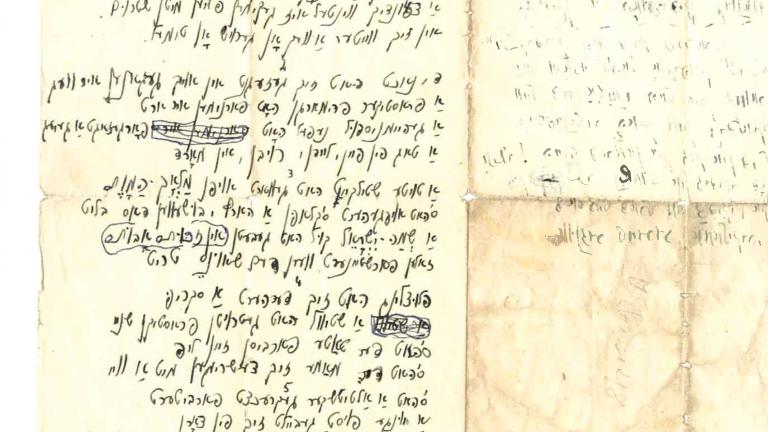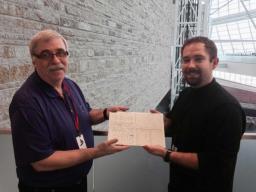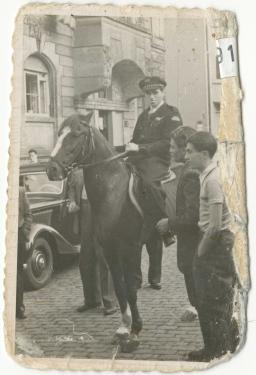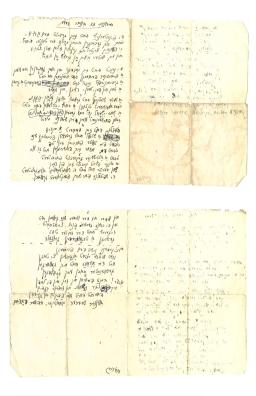One of the pieces of the Museum’s collection is a poem from the Holocaust, written in the Yiddish language on January 13, 1943, by Herschel Zynoberg. The handwritten poem makes clear that, in spite of the Nazis’ campaign to eradicate all traces of Jewish identity, Herschel held onto hope.
A Yiddish poem from the Holocaust
A single poem reminds us that even in the midst of atrocity, human dignity persists
Published: April 14, 2014
Tags:

Photo: Canadian Museum for Human Rights Collection, gift of Stan Zynoberg
Story text
Herschel was born in Radom, Poland in 1917. His family was caught up in the Holocaust after the Nazi invasion in 1939. During the Second World War, Herschel was sent to the Radom Ghetto, and then to Auschwitz, where his life was spared due to the fact that the Nazis required his skills as a tailor. After the war, Herschel ended up in a displaced persons camp in Stuttgart, Germany. He came to Canada with his wife (also a survivor) around 1947–1948, and passed away in 1999.
When Herschel’s son Stan rediscovered the poem in 2012, he said the thought was almost immediate – he wanted to donate it along with its English translation1 to the Museum. We excitedly decided to accept the poem into our permanent collection, as it very clearly fits with the Museum’s mandate to promote dialogue and reflection around human rights. Not only is it a unique piece of personal history directly from the Holocaust, but it exemplifies the persistence of human dignity. It embodies Herschel’s retention of his religious, cultural and linguistic identity, even in the face of the Nazis’ brutal campaign to eradicate all traces of precisely this identity. Given that Herschel wrote this poem in the midst of his experiences during the Holocaust, one of the most compelling aspects is how it interweaves despair and hope. The poem vividly conveys the sense of hopelessness in the ghetto – “The darkness still hung over the surroundings. The sad sky still hung over the ghetto.” It describes the young and old, fathers and mothers awaiting the Angel of Death (“Malech Hamavos”). It also speaks to the threat of violence in the ghetto, describing the “white snow turn[ing] red” after hearing “a boot moving in the frosty snow.”

Stan Zynoberg and Museum Curator Dr. Jeremy Maron with a copy of Herschel Zynoberg’s poem.
Photo: CMHRYet at the same time, there are elements of hope. First, the poem speaks to resistance and dignity. Written on the exact date2 of a deportation from Radom to Treblinka, Herschel exclaims, “And the brown heart’s face blazed. Victorious they faced death. Crying out triumphant.”
The poem also longs for the continuation of the Yiddish language, people and culture. Yiddish, a primary language of the majority of Jews killed in the Holocaust, was almost eradicated as millions of Yiddish‐speakers were murdered. At the end of the poem, Herschel envisions “Our dear ancient Yiddishkeit” flourishing eternally in paradise (in “Gan Eiedn,” the Garden of Eden).
Lastly, there is a call for remembrance. Not only is the author remembering (“Yiskor! Today I remember all that I suffered”), but there is also an implicit call for the reader to remember all those targeted in the Holocaust, the keepers of “Yiddishkeit” (Jewish culture).
After we received this meaningful piece of Holocaust history, we asked Herschel’s son Stan what this poem meant to him. He replied: “To me, that poem is my father’s experience in the war. It has almost a doomsday feeling. I think he wrote that not expecting to come out of it alive.” Stan feels that with the poem, his father was trying to leave something behind, saying, “This is my legacy. Don’t forget.”
And we won’t.
__________________________________________________
1 January 13, 1943
The darkness still hung over the surroundings
The sad sky still hung over the ghetto
A small wind flew with the storm
And left further without any rush or fuss
The evening left us and went on its way
A frosty early morning came in replacement
An unusual fog announced a problem
A day of pain, suffering, theft and murder
A dead stillness awaited the Malech Hamavos
The heart stopped, the blood boiling
A voice pleaded Shma Israel
That the enemy’s footsteps be destroyed
Suddenly a scratching noise was heard
A boot was moving in the frosty snow
The father bit his lip
The mother cried out in pain
An old person sighed bitterly
A young fist bent with fury
For a third time the terrible times made us tremble
And that froze with fright
And once again the white snow turned red
And the brown heart’s face blazed
Victorious they faced death
Crying out triumphant
Not seizing the morning
Not how a day has started
Because the devil was choking me
And hurting me
Yiskor! Today I remember all that I suffered
I see souls in silk clothes and there
With the righteous in Gan Eiedn
Our dear ancient Yiddishkeit
2 As the specific date of Herschel’s deportation from the ghetto to Auschwitz is unknown, it is uncertain as to whether he wrote the poem in the ghetto or from his memory of the ghetto during his internment at Auschwitz. However, given the implicit reference to resistance and the dating, it is likely that he wrote the poem while still in the ghetto, in the midst of the preparations for resistance.
Suggested citation
Suggested citation : “A Yiddish poem from the Holocaust.” Canadian Museum for Human Rights. Published April 14, 2014. https://humanrights.ca/story/yiddish-poem-holocaust

